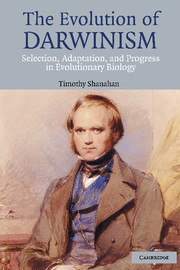Appendix: What Did Darwin Really Believe About Evolutionary Progress?
Published online by Cambridge University Press: 18 December 2009
Summary
The “Mainstream” Interpretation
In Chapter 7, I constructed an interpretation of Darwin's thoughts on evolutionary progress gleaned from writings (private notebooks, unpublished manuscripts, published works, correspondence) spanning some twenty years. I argued that, based on the available evidence, it must be concluded that Darwin was a committed progressionist, in the qualified sense there explained. And yet, the question of Darwin's real view of evolutionary progress has been a contentious issue amongst scholars. The problem arises for two reasons. First, at times Darwin does indeed sound like a committed progressionist, whereas at other times he sounds positively scornful of the very idea. Unless Darwin was flat-out inconsistent (or just plain confused), some explanation of this disparity must be offered. Second, because “progress” is a noxious concept for many contemporary biologists (and historians), they find it incredible that Darwin himself took the idea seriously, or perhaps even embraced it enthusiastically. In support they can offer the following argument: The principles of Darwin's theory provide no justification for the belief in evolutionary progress. Surely Darwin himself realized this. Therefore he could not really have believed in it, his occasional (apparent) endorsements of progress notwithstanding.
I attempted to resolve the first of these two problems by arguing that in interpreting Darwin's view it is important to take chronological considerations into account (Darwin's view changed as his ideas developed), as well as the range of distinctions Darwin was careful to make in working out his own view (e.g., contingent vs. necessary evolutionary progress).
- Type
- Chapter
- Information
- The Evolution of DarwinismSelection, Adaptation and Progress in Evolutionary Biology, pp. 285 - 294Publisher: Cambridge University PressPrint publication year: 2004



